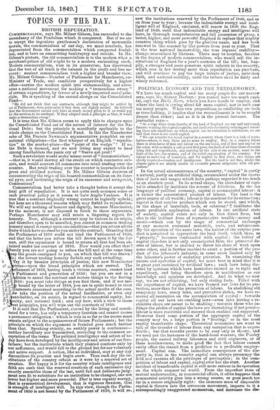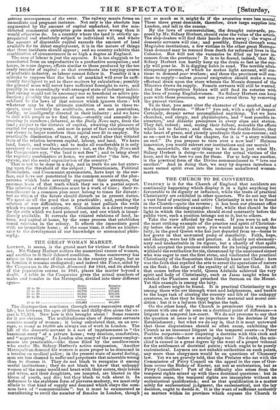POLITICAL ECONOMY AND THE NEEDLEWOMEN.
WE have too much capital and too many people for our narrow area, says Mr. Sidney Herbert : you cannot have too much capi- tal, says the Daily News, where you have hands to employ, and where the land is crying aloud for more capital, nor in such case too many people. When two propositions so conflicting are both so true-looking, it implies that the reconcilement is to be sought deeper than either ; and so it is in the present instance. The journalist says— "At a tirpe when three-fourths of the land of England are but half cultivated, farmers wanting the capital requisite, and landlords obstinately refusing and resist- ing those sole conditions on which capital can be embarked in cultivation, we are told that there is too much capital. " We can conceive too much capital in a country where there is a lack of popu- lation—where, in fact, there are no arms to employ. But, in a country where there is abundance of men and labour on the one hand, and of food and capital on the other, with as fertile a soil as ever God gave, the fault of all these three elements lying idle and unprofitable, and starving by the side of one another, must be the fault of the law, the system, and of the social organization of the country. For labour to make use of materials, and for capital to find them, two things are chiefly required—freedom and intelligence. But the land is not free, whilst the classes upon it are utterly unable to reconcile present exigencies with old pre- judices."
In the actual circumstances of the country, " capital" is partly a natural, partly an artificial thing, accumulated under the opera- tion of laws and usages which have perhaps regarded it too much as an absolute good. In its actual shape, the abundance of capi- tal is attended by incidents the reverse of felicitous. In the lax language of political economy, capital is accumulated labour : it is rather the accumulated product of labour. The land is the great source of all wealth labour is the machine for its extraction; capital is that surplus product which can be stored, and which, in the shape of materials, tools, or subsisters' .1 facilitates the more profitable application of labour. In our artificial state of society, capital exists not only in that direct form, but also in the indirect form of representative wealth—money and credit—which can by the usage of commercial exchange at any moment command materials, tools, and subsistence. By the operation of the same laws, the holder of the surplus pro- duct is permitted to appropriate the laud itself, which thus, as " property," becomes confounded with capital : the holder of capital therefore is not only emancipated from the primaeval de- cree of labour, but is enabled to throw his share of work upon some other, and is further enabled to exact a portion of the pro- duct of the labourer's industry, in some cases limited only by the labourer's power of enduring privation. In examining the nature and operation of capital, we must bear in mind that it is in great part sustained by artificial laws ; such laws being dic- tated by opinions which have heretofore existed as to right and expediency, and being therefore open to modification as our knowledge and opinions are developed. And in what we now say, we are not criticizing, but only stating facts. Filled with the importance of capital, we have framed our laws for its pro- tection, more than for the protection of labour. In abolishing old sumptuary laws, usury laws, and protective duties, we have re- moved all restriction on the accumulation of capital : towards capital all our laws are enabling laws—even laws having a re- strictive shape are meant to be enabling : towards those who in- fringe the profits of capital the laws are disenabling if not penal— labour is more restricted and coerced than enabled and supported. However fixed some portion of the aggregate capital of the country may be, a large portion is "floating," or in the most readily transferable shape. Theoretical economists are wont to talk of the transfer of labour from any occupation that is unpro- fitable ; but that transfer proves to be easy only in theory, and we need not the instances of the hand-loom weavers, the Paisley people, the ousted railway labourers and civil engineers, or of these needlewomen, to make good the fact that labour cannot easily effect the transit from a profitless to a profitable employ- ment. Capital can. The immediate consequence of the dis- parity is, that in the transfer capital can always preoccupy the field and exercise all the privileges of preemption ; in the com- petition of labour and capital, capital ever has the start. Another incident of transferable capital is still more serious in its operation on the whole commercial world. From the imperfect state of mutual understandini; in commercial affairs, it often happens that commercial activity goes into a wrong course, or goes much too far in a course originally right : the immense mass of disposable capital is thrown into the erroneous movement, imparts to it a correspondingly exaggerated momentum, and increases the dis- estrous consequences of the error. The railway mania forma an immediate and pregnant instance. Not only is the absolute loss augmented by the amount of capital embarked, but the mis- directed commercial enterprise goes much more wrong than it would otherwise do. In a country where the land is strictly ap- propriated and absolutely subject to individual will, and where the amount of disposable capital exceeds the amount of land available for its direct employment, it is in the nature of things that these incidents should appear ; and no country exhibits that combination of circumstances in so high a degree as England. The case of labour is just the opposite. It is too sluggish to be transferred from an unproductive to a productive occupation ; and hence, in some degree, effects similar to those produced by the too ready transfer of capital : as that overshoots the varying course of profitable industry, so labour cannot follow it. Possibly it is a mistake to suppose that the bulk of mankind will ever be suffi- ciently intelligent to act in these matters by calculation; possibly the general mass will never have sufficient foresight to save, and possibly in an exceedingly well-arranged state of industry indivi- dual saving would not be necessary nor so beneficial as active pro- duction ; possibly the passions of men will never be thoroughly subdued to the laws of that science which ignores them : but whatever may be the ultimate condition of men in those re- spects, most certainly the multitude, now, are not passionless, thrifty, or intelligently directed in their industry: and we have to deal with people as we find them,—steadily and annually in- creasing in numbers ; debarred, as the Daily News says, from the land ; subject to the dictates of capital, awaiting the pleasure of capital for employment, and now in point of fact existing within our shores in larger numbers than capital sees fit to employ. No practicable diminution of taxes, if any, could alter that vitiated state of the relation between capital, labour, and land. We have land, hands, and wealth ; and to make all comfortable it is only necessary to combine these elements : but, as the Daily News and the Communists say, "the land is not free"; and to bring about the requisite combination at home, we must alter " the law, the system, and the social organization of the country." That is not to be done in a day, and in truth we are but enter- ing upon the threshold of the subject : Protectionists, Political Economists, and Communist systematists, have kept to the sur- face, and have not penetrated to the common source of the phse- nomena which have severally engrossed their attention, the common basis of that truth which they see in a partial aspect. The solution of their difference must be a work of time ; their re- concilement in a common plan must belong to times far distant : but no vision of the future should disturb us in present duties. We must do all the good that is practicable; and, pending the solution of our difficulties, we may at least palliate the evils which we cannot yet extirpate. Colonization is a direct remedy for the evils which we have pointed out, and one which is imme- diately available. It corrects the vitiated relations of land, la- bour, and capital at home, by the same process that establishes sound relations in the colony. It effects the immediate good with no immediate harm ; at the same time, it offers no hinder- ance to the development of our knowledge or economical philo- sophy.



























 Previous page
Previous page